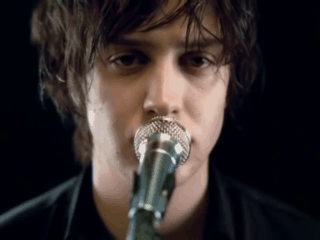#the quality of this one versus the nick one makes me so sad
Text





Jody Shelley puts Kent Johnson in the hot seat in Under Review
#babygirl why are you so nervous#kent johnson#cbj#jessgifs#the quality of this one versus the nick one makes me so sad
105 notes
·
View notes
Text
When It Started: Julian Casablancas
The Strokes lead singer was born on August 23, 1978 in New York City. His father John was the founder and owner of Elite Model Management, while his mother Jeanette worked as a Danish model and former Miss Denmark. At the age of eight, his parents would divorce. His mother would later marry painter Sam Adoquei, who heavily influenced the young Casablancas by introducing him to classic rock artists such as the Doors. Julian has several half brothers and half sisters through his father’s multiple marriages. The future frontman of the Strokes would attend a variety of schools throughout his early life, which led him to meet many of the future members of the band through schools such as Lycée Français de New York, the Institut Le Rosey boarding school in Switzerland, and the Dwight School in New York. At the latter, Julian would start to informally play music with Nick Valensi and Fab Moretti, which ultimately was the beginning of the Strokes. The singer would never finish high school, but did receive his GED in place of it. He would later attend music classes at Five Towns College, which became the very first time that Casablancas actually enjoyed going to school.
Throughout the history of the Strokes, Julian has served as the principal songwriter for the group. Some have said that he would insert a large measure of control over the music, but he and other members have said that does not seem to be the case anymore. Each member of the group brings their own ideas about future songs, then the band decides what to use and what to discard. Nick Valensi would say this about the singer. “His ear is so sharp. He's the one with the ear for detail in this band. Creatively, he is a force to be reckoned with." In 2009, Casablancas released his first solo album entitled Phrazes for the Young through RCA. He would talk about releasing music as a solo artist versus material from the Strokes. “It’s like touring with me or with five of me." The singer would also go on to say that as a solo artist he is able to experiment with his music and lyrics in ways that he would probably avoid in the Strokes. He has always been quite adamant the brand name that is the band should be protected. The title of the album had been inspired by the Oscar Wilde book, Phrases and Philosophies for the Use of the Young, while the album itself embraced a very 1980’s new wave sound that had a heavy emphasis on the use of synthesizers. He talked about this new direction in his music. “I would've gone weirder with the music, but I wanted to be smart. I didn't want people to say, 'Okay, this is his weird abstract thing,' and dismiss the album. I worked too hard on it for that to happen... I wanted to be crazy original and bridge the gap between traditional music and modern music." The LP would be recorded in New York and Omaha, Nebraska with producer Jason Lader and some additional assistance from Mike Mogis of Bright Eyes. A tour would follow the release with a backing band called the Sick Six including Jeff Kite (keyboard), Nelson London (synthesizer), JP Bowersock (guitar), Danielle Haim (percussion) and Alex Carapetis (drums). The first major shows in North America took place over the course of a month at the Downtown Palace Theater in Los Angeles. This venue had been previously used in the Michael Jackson “Thriller” music video.
In 2013, Julian began another side project called Julian Casablancas + the Voidz. Other members of this new band included Jeramy "Beardo" Gritter and Amir Yaghmai on guitar, Jacob "Jake" Bercovici on bass (as well as synthesizer), Alex Carapetis on drums and percussion, and Jeff Kite on keyboard. In 2017, the group wanting more recognition as a band rather than a side project changed its name to simply the Voidz. The goal of the group was to create music that represented a quality of being both very aggressive and quite complex. As lead vocalist and songwriter, Casablancas began to explore musical scales within Middle Eastern music, not any traditional Western scales. Jake Bercovici has said, they are interested in “exploring [music] from the margins.” The singer looked upon the group as a vehicle in which he could create music that embodied characteristics much more experimental than anything that the Strokes ever offered. Their debut album Tyranny was released in September 2014 through Casablancas’s own record label, Cult Records. The album would also feature an 11 minute single entitled “Human Sadness,” which Julian actually wrote originally for a short documentary film about his stepfather, painter Sam Adoquei. Their second album would be released in March 2018 entitled Virtue, which took on a much stronger political point of view emphasizing the paradox between truth and lies.
Over the years, Julian has collaborated on a number of tracks with other artists. In 2006, the Strokes teamed up with Eddie Vedder and Josh Homme for a cover of “Mercy Mercy (The Ecology)” by Marvin Gaye. On the track, Vedder sang backup vocals, while Homme would play drums. In 2008, he recorded a collaboration with Pharrell and Santigold for Converse on a track called “My Drive-thru.” In 2009, the singer lent his vocals to the comedy trio the Lonely Island for a parody song on their debut album Incredibad called “Boom Box.” The Strokes frontman would later record a cover of another Saturday Night Live parody, “I Wish It Was Christmas Today.” He would eventually perform the song live with Jimmy Fallon, Horacio Sanz, and the Roots on Fallon’s talk show. In 2010, Casablancas sang vocals for the track “Little Girl” on the 2010 Sparklehorse and Danger Mouse album Dark Night of the Soul. In 2011, Julian performed the song “Rave On” for the release of a Buddy Holly tribute record. In 2013, he would also provide vocals, lyrics, and guitar to the Daft Punk song instant crush on their 2013 record Random Access Memories. The album would go on the win the Grammy for Album of the Year, which he would receive recognition for his work on it. In 2015, Julian created a cover with Jehnny Beth of the 1983 song Boy/Girl, which would be released through Cult Records. In 2016, he would also provide covers for the soundtrack to the HBO series Vinyl performing three tracks by the Velvet Underground, “Venus in Furs,” “Run Run Run,” and “White Light/White Heat.” That same year, the singer would pen a song for Har Mar Superstar on his album Best Summer Ever entitled “Youth Without Love.”
In 2009, Casablancas started his own music label, Cult Records. The company currently includes a roster of The Growlers, Har Mar Superstar, Songhoy Blues, Rey Pila, Karen O, Promiseland, The Strokes, The Voidz, Exhibition and Cerebral Ballzy. Past artists were Albert Hammond Jr., The Virgins, Reputante, INHEAVEN, Exclamation Pony and Nelson London (C O L O R). The company first began as an imprint in order to release his first solo album Phrazes for the Young. As for his influences, the earliest ones were the Doors and Velvet Underground. He would say this about the latter group. “The way Lou Reed wrote and sang about drugs and sex, about the people around him — it was so matter-of-fact. He could be romantic in the way he portrayed these crazy situations, but he was also intensely real. It was poetry and journalism." Other influences include Bob Marley, Nirvana, and Pearl Jam. He would later say that the song “Yellow Ledbetter” inspired him to start making music. In his personal life, the singer would marry the Strokes assistant manager, Juliet Joslin in 2005. They have two sons together, but divorced in 2019. In the early days of the Strokes, Casablancas struggled with drinking, but he has been completely sober since 2009. Julian would say in an interview about trying to quit drinking, he was “hungover for five years.”

10 notes
·
View notes
Text
Aimee Mann Finds 'Mental' Health Returning to a Quieter Solo Career
Aimee Mann Finds 'Mental' Health Returning to a Quieter Solo Career
The singer-songwriter released her ninth studio album, ‘Mental Illness,’ on March 31.
Sometimes you finally have to gravitate back toward what Irving Berlin called “doin’ what comes natur’lly” — and in Aimee Mann’s case, what comes naturally is slower and somberer. “I gave myself permission to make a record that was everything I imagine people think I am… super depressing and bordering on mentally ill,” she says, referring to a new album that is titled, with tongue-in-cheek probity, Mental Illness.
For anyone attuned strictly to the contemporary hits world, the album — which dropped Friday (March 31) — may come off as the downer sardonically promised, but most Mann fans will have an ironically ebullient response to the drift toward an exquisite minimalism in her first album in five years. During her time away from the solo limelight, she worked with Ted Leo on the duo project The Both, which didn’t do anything to diminish the cult she had built — as evidenced by the number of shows already sold out on a spring tour that begins April 20 at Washington, D.C.’s Lincoln Theatre and wraps up May 13 at L.A.’s Theatre at Ace Hotel.
Talking with Billboard, Mann touched on why she has momentarily abandoned rocking out, where she and her producer fell on the Bread-versus-Nick-Drake divide, the varieties and definitions of mental illness, and whether Donald Trump counts when it comes to the titular subject.
Mental Illness marks a big a stylistic change-up from your last couple of projects, (2012’s) Charmer and (2014’s) The Both, which had a lot of power pop going on. This one is all about the mellow gold. Was there a conscious thought during the writing to make a pendulum swing back toward quieter sounds?
I just like the idea of having a record you can put on and have it, from beginning to end, deliver the same kind of lonely, melancholy, dark, wistful experience. I wanted to get away from bigger production. And with the Both record, that production was pretty stripped down — but it was a rock band, and I didn’t feel any real pull this time to try to write more up-tempo or rock songs.
After touring in smaller rock clubs as a trio and playing bass with The Both, I decided to write a record was the distillation of what I assumed people thought of me, if they thought that my songs were very down-tempo and very sad. But I really wanted to take it all the way stripped down, kind of like Leonard Cohen-type things, back in the real folk days — that was my initial goal. It definitely ended up more fleshed out than that, but that’s where I was trying to keep it. I think people might be ready for something super-sad and soft. But another part of it is like, why not? Because there’s a certain liberated feeling in the idea of knowing that nobody buys records anymore. If nobody buys records anymore, you can really do whatever you f—ing want!
https://www.youtube.com/watch?v=YxQg4VVNKGQ
Did you and (longtime producer) Paul Bryan talk a lot about touchstones?
We had a lot of conversations before we started about the sounds that we were trying to go for and sample records, without trying to imitate anybody. He was a big Nick Drake fan. People always tell me about Nick Drake, but I’m not personally that familiar. But acoustic with strings — that’s kind of his deal, right? I was also listening to a lot of really soft ‘70s rock, like Bread and Dan Fogelberg… you know, the finger-picky stuff. Going for as soft as we can get it was kind of the goal.
You recently released a Carpenters cover (“Yesterday Once More”), but no one is going to compare this album to the Carpenters too much.
No. And the Carpenters song was for [Martin Scorsese’s HBO] show Vinyl, and I think they were trying to just do a straight copy, to make it sound as much like the original as possible. That was a Joe Henry production.
You’ve mentioned Bread a number of times, but your writing sensibility is so different, no one is going to listen to the new album and think, “Oh, this is just so David Gates.”
I was listening to a lot of Bread, but more as a sonic reference, along with things like Loggins and Messina’s “Danny’s Song.” And we listened to some Bill Withers, “Ain’t No Sunshine.” My question was, how stripped down does a record have to be to retain the feeling of being stripped down, or can it have strings? Can it have bass? Can it have some percussion? Because I did want it to sound really bare. I was curious to go back to certain records and see really what kind of acoustic guitar sound they had: Was it strummed? Was it plucked? Mostly there was fingerpicking, which I’m not really that good at, so I had to get my friend Jonathan Coulton to do the fingerpicking stuff. So that was the brief: to see what acoustic guitar sounds went with other sounds to still make it sound really sparse.
More of the songs than not on this album have string arrangements, but they’re generally pretty subtle. Did you look to string arranger Paul Buckmaster’s work with Elton John back in the day for any inspiration?
We looked at Paul Buckmaster as a model for one specific song, the last song on the record, “Poor Judge.” Because I felt like that could be just piano and strings in that Madman Across the Water, “Levon” or “Tiny Dancer” (vein). This is my theory about his arranging: that he arranges strings like a horn section. They often take the melody in unison, and they’re very stabby and punchy, more horns than strings were arranged up to that point. So we looked to him for that song.
But Paul Bryan, who wrote all the arrangements, is more of a big Nick Drake fan, and I was actually just talking to him about it last night. He said another influence was this Brazilian artist, João Gilberto, who had this record (in 1976) called Amoroso. He said he liked the sound of the icy strings next to a warm voice. I was skeptical of the idea of strings on almost every song. It’s not as simple as my original concept for the album. But every arrangement was so different. On some, strings would just come in on the bridge, so it still retained the feeling of an acoustic or really stripped-down record. Some of the strings were more prominent, but I think from song to song, it varies enough so it keeps it interesting.
You haven’t shied away from giving people fair warning about the album’s downbeat qualities. But do you think fans experience it as depressing? Good songwriting always has a quality of exhilaration no matter what the tone or subject may be. And just as someone who’s feeling down may get some hope out of looking at a self-help book just because it puts a name on what they’re experiencing, you put a rhyme on people’s experience. That can feel uplifting even if the lyric captures a seemingly hopeless moment.
Yeah, that’s exactly how I feel. I read Facebook posts (about current events), and if someone has a real succinct sum-up of a horrible thing that’s going on, it’s uplifting, because it makes you feel less alone and that maybe together this is a problem that could be solved. Feeling isolated in your problems and your feelings is kind of the worst part of it. If you feel like somebody shares it and is also thinking about it and how to get out of it, to me, that’s an uplifting experience. I think people like to think somebody understands the more difficult things that they go through.
Just to ask a little about some of the imagery associated with the album. “Goose Snow Cone” was inspired by the cat of the title, and you used the actual Goose in the video, where she’s in some mortal jeopardy. And then on your album cover, you have this strange, chick-like creature seen through the thorny brambles of some dark woods. Is there some kind of theme going on with winsome creatures experiencing some kind of darkness?
I felt like that cover got at the psychological world of that subconscious stuff that’s all dark and murky, but there’s this creature, and it’s kind of a monster, but it’s also sort of cute and funny. That’s kind of the attitude I have about having issues and writing songs about your issues and writing songs about other people’s issues — that it is dark and difficult and it’s a little scary, but also, there’s an element of humor about it. You know, we’re all struggling with the same kinds of things, and there’s definitely an element of humor in recognizing one of your crazy things in other people, or vice versa.
https://www.youtube.com/watch?v=fhThS-PJOFE
Although there aren’t many happy songs on the album, you managed to deliver some cheer and light into the world with the “Goose Snow Cone” video, which of course is an actual cat video. She experiences a health crisis in the video and spends some time with the vet, but you didn’t actually kill the cat. I felt confident you wouldn’t.
My friends post a lot of pictures of their cat, Goose, on Instagram, and she’s got white fur, and she really looks like a snow cone ball. So I start writing this song, and it’s really more about being homesick and lonely than it is about the cute little kitty. It’s very dumb that I kept the name, but once I wrote the song, I was stuck with it. Her owners moved out here, so I put Goose in the video. Goose is a good cat. She’s very photogenic. She wasn’t really cooperative. I was amazed what they did with editing where they got shots later that made it look like she was cooperating.
You have some more famous faces in the video for “Patient Zero,” but the song itself has some different things going on, and seems to be about a young person coming to Hollywood and finding success elusive. “Patient Zero” is a quintessentially spooky L.A. song, with references to The Big Sleep and Day of the Locust and the enticingly out-of-reach lights of the city. You know a lot of people in the film business. Is it worse than the music business, as far as being a mass frustrater of dreams?
I suspect that the movie business is worse than the music business. At least in music, it is possible without a ton of money to make some kind of recording and put it out into the world in some way. You can’t really do that if you’re an actor — you’re at the mercy of bad scripts and bad directors, and the politics, whether it’s studio politics or other actors who dislike you. I wrote that song about… well, not really about, but inspired by Andrew Garfield, who I met at a party years ago. It was before Spider-Man, and he had just come to Los Angeles and it was clear he did not feel like he fit in. I just had a moment of feeling like “You know, I kind of worry about this guy!” Because I felt like he is a real artist and very sincere, and I think to be a real artist the way he is, you have to be a very vulnerable person. And I just worry about vulnerable people. It’s not necessarily just his town, but in the world of big business, whatever that business is. I mean, he obviously did fine. But I think being famous is very difficult. It’s a weird kind of trauma and I think it makes people crazy. If everybody around you is saying you’re amazing and all your choices are great, there are no touchstones.
The life of the super-famous has special requirements. It’s a very rare person who can withstand it. My guess is that (Garfield) tried to have a career that’s a little more artistic and not focused on franchises. But somehow I was inspired to write this story about someone who comes to Hollywood with the promise of being in this big movie, and he’s maneuvered out of it. To me it’s almost a bit of a happy ending, because it’s like, this was never the place for you anyway. It’s not the town for me. And that was influenced a little bit by Nathaniel West and the people who write about Los Angeles in this more noir category (about the city’s) creepy underbelly.
Did you ever feel that way about your own fame, even if it wasn’t on a Hollywood blockbuster anchor level?
With my brush-up with fame, when ‘Til Tuesday was popular for a minute, it was certainly weird, and I found it very off-putting, because I didn’t really like people looking at me. That made me feel uncomfortable. I think only a real narcissist enjoys constant attention. To me, constant attention feels vaguely threatening. People expect things out of you you’re not going to be able to deliver. I don’t like that state. I like low expectations. I think about this a lot, because even in my own situation, if I’m on tour, and if we’re going into the hotel and somebody offers to carry my suitcase or something, it’s like “Oh, they’re being really nice because they’re my friend.” You can’t pretend to yourself that you as a person are so wonderful that people just want to carry your bags all the time! It’s not like people carry my bags, but still.
On this album, you have some songs about compulsive liars or drunks — just generally unstable people — and their victims including “Lies of Summer.”
I wrote “Lies of Summer” about somebody who’s had a specific kind of crisis, and all their lies and craziness exposed. I think once you realize that somebody’s a pathological liar, then you kind of scroll back through all the encounters that have just been slightly off, and then you see those in a different light.
“Knock It Off” is kind of a tough-advice song in the vein of “Wise Up�� (from Magnolia). You almost seem to be invoking a Lloyd Dobler sort of Say Anything moment when you sing “Oh baby, knock it off, you can’t just stand there on her front lawn,” except you’re taking all the romanticism out of it.
That’s what people think of as the sort of cinematic/romantic moment, where you’re standing on somebody’s lawn, hoisting the boom box over your head. But it’s crazy behavior! It’s not taking no for an answer, which is not a great trait in a relationship. In the story of this song, this person’s behavior has just been so egregious, but after all his lies were revealed, he can’t understand why his girlfriend broke up with him. Like, ‘Why would you not trust me? I’m not getting credit for the 99 times when I didn’t lie!’ To me that’s fascinating, because that really is sociopath thinking. It’s always a fresh new day, and (the sociopath) is weirdly present, but sort of too present, because they forget that the past has consequences in the present.
There are other songs on this album that are encounters with crazy people. “You Never Loved Me” is about a friend of mine who was engaged to marry somebody and moved across the country to be with them, and they just disappeared on her. It’s certainly supposed to be a little bit wry and ironic and not entirely “Boo hoo for me.” I picture the narrator shaking their head and going, “Wow. You really stuck it to me. Good for you.”… I think sociopaths just don’t have that fear that most of us have, where we live most of our lives going “I hope this person likes me” or “Is my loved one mad?” or “How can I make this person happy, because it makes me happy?” We are connected to other people in an emotional, underground kind of way, and I think they’re just not.
Do you think there’s a clear delineation between people who have garden-variety neuroses and those who are mentally ill, or is it a sliding scale between us and some of your more disturbed characters? With the album’s title, were you thinking, ‘Everyone is mentally ill,’ in some certain loose way of thinking?
I certainly do think everybody’s got their thing. I wouldn’t go so far as to say everybody’s mentally ill. I’ve seen a lot of talk about Trump having narcissistic personality disorder, which I 100-percent agree with, but I don’t even know if that qualifies as a mental illness. There are definitely a few about a person I knew who probably is a sociopath, and those were kind of the main mental illness-y songs… I think another way to look at that is, people are trapped in compulsive behavior. I do think it’s on a continuum. Someone who’s just kind of garden-variety f—ed up, that has issues, of repeating the same mistakes or whatever, I don’t want to put that in the category of mentally ill. But I see how denial, when amplified and clung to, starts to encroach upon delusion.
I mean, we see it in our president. I don’t think that he can tell reality from the fiction that he has created. If he says something because he wants it to be true, I think at this point he believes that it makes it true. And I think that is delusional, and it’s hard to say that that kind of delusion is not mentally ill. But it’s self-created. I mean, I don’t think he started out schizophrenic and not able to tell reality from fantasy. I think that it’s a kind of willful, self-imposed brain damage. I definitely think it’s possible to walk yourself into that, just like you can walk yourself out of it one step at a time. Maybe not entirely in everything, but I certainly think there’s an element of work and help that you can take yourself out of being in a pretty bad mental state.
You see hope in these situations, but where does that come into the songs? A lot of them seem to leave the characters trapped, in their own bad behavior or in enabling somebody else’s.
I think with relationships, especially romantic relationships, the decisions you make are less decisions than blind impulses that are almost impossible to resist. Because it bypasses all thinking — even the times where you know, “Hmm, this person’s just like my mother,” or “This dynamic is exactly like the same dynamic I had with X, Y and Z.” I mean, I do it with friends, too. We form our patterns and we go to our spots, and it’s really cognitively painful to wrench ourselves out of those patterns. But it’s fascinating to see how the dynamic can change by just taking the smallest aspect of it and working on it. You can’t change another person, but if you change where you are in the cycle, then everything changes. I think that’s very encouraging and kind of weirdly exciting. And I think the interesting point at which a song gets written is the lament before the solution is either thought of or implemented. Sometimes there’s a benefit in just saying, “I give up, I can’t go on,” and having that moment before then you go on.
This article originally appeared on Billboard.
http://tunecollective.com/2017/04/02/aimee-mann-finds-mental-health-returning-quieter-solo-career/
0 notes